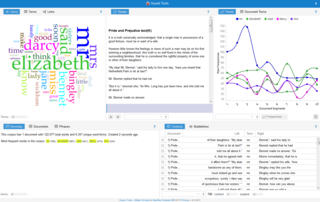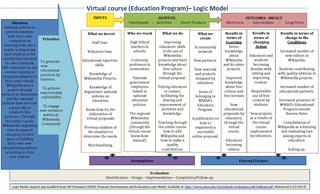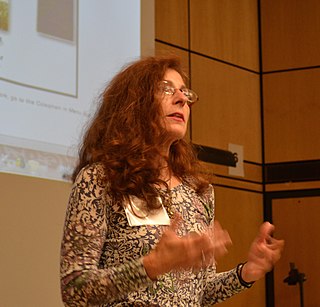Media literacy is an expanded conceptualization of literacy that includes the ability to access and analyze media messages as well as create, reflect and take action, using the power of information and communication to make a difference in the world. Media literacy is not restricted to one medium and is understood as a set of competencies that are essential for work, life, and citizenship. Media literacy education is the process used to advance media literacy competencies, and it is intended to promote awareness of media influence and create an active stance towards both consuming and creating media. Media literacy education is part of the curriculum in the United States and some European Union countries, and an interdisciplinary global community of media scholars and educators engages in knowledge and scholarly and professional journals and national membership associations.
The Graduate School and University Center of the City University of New York is a public research institution and postgraduate university in New York City. Serving as the principal doctorate-granting institution of the City University of New York (CUNY) system, The CUNY Graduate Center is classified among "R1: Doctoral Universities – Very High Research Activity". The school is situated in the landmark B. Altman and Company Building at 365 Fifth Avenue in Midtown Manhattan, opposite the Empire State Building. The CUNY Graduate Center has 4,600 students, 31 doctoral programs, 14 master's programs, and 30 research centers and institutes. A core faculty of approximately 140 is supplemented by over 1,800 additional faculty members from CUNY's eleven senior colleges and New York City's cultural and scientific institutions.
Computers and writing is a sub-field of college English studies about how computers and digital technologies affect literacy and the writing process. The range of inquiry in this field is broad including discussions on ethics when using computers in writing programs, how discourse can be produced through technologies, software development, and computer-aided literacy instruction. Some topics include hypertext theory, visual rhetoric, multimedia authoring, distance learning, digital rhetoric, usability studies, the patterns of online communities, how various media change reading and writing practices, textual conventions, and genres. Other topics examine social or critical issues in computer technology and literacy, such as the issues of the "digital divide", equitable access to computer-writing resources, and critical technological literacies. Many studies by scientists have shown that writing on computer is better than writing in a book

Open educational resources (OER) are teaching, learning, and research materials intentionally created and licensed to be free for the end user to own, share, and in most cases, modify. The term "OER" describes publicly accessible materials and resources for any user to use, re-mix, improve, and redistribute under some licenses. These are designed to reduce accessibility barriers by implementing best practices in teaching and to be adapted for local unique contexts.

Sage Publishing, formerly SAGE Publications, is an American independent academic publishing company, founded in 1965 in New York City by Sara Miller McCune and now based in the Newbury Park neighborhood of Thousand Oaks, California.
Roy Rosenzweig Center for History and New Media (RRCHNM), formerly the Center for History and New Media (CHNM), is a research center specializing in digital history and information technology at George Mason University (GMU) in Fairfax County, Virginia. It was one of the first digital history centers in the world, established by Roy Rosenzweig in 1994 to use digital media and information technology to democratize history: to incorporate multiple voices, reach diverse audiences, and encourage popular participation in presenting and preserving the past. Its current director is T. Mills Kelly.

Digital humanities (DH) is an area of scholarly activity at the intersection of computing or digital technologies and the disciplines of the humanities. It includes the systematic use of digital resources in the humanities, as well as the analysis of their application. DH can be defined as new ways of doing scholarship that involve collaborative, transdisciplinary, and computationally engaged research, teaching, and publishing. It brings digital tools and methods to the study of the humanities with the recognition that the printed word is no longer the main medium for knowledge production and distribution.
The California Digital Library (CDL) was founded by the University of California in 1997. Under the leadership of then UC President Richard C. Atkinson, the CDL's original mission was to forge a better system for scholarly information management and improved support for teaching and research. In collaboration with the ten University of California Libraries and other partners, CDL assembled one of the world's largest digital research libraries. CDL facilitates the licensing of online materials and develops shared services used throughout the UC system. Building on the foundations of the Melvyl Catalog, CDL has developed one of the largest online library catalogs in the country and works in partnership with the UC campuses to bring the treasures of California's libraries, museums, and cultural heritage organizations to the world. CDL continues to explore how services such as digital curation, scholarly publishing, archiving and preservation support research throughout the information lifecycle.

Project MUSE, a non-profit collaboration between libraries and publishers, is an online database of peer-reviewed academic journals and electronic books. Project MUSE contains digital humanities and social science content from over 250 university presses and scholarly societies around the world. It is an aggregator of digital versions of academic journals, all of which are free of digital rights management (DRM). It operates as a third-party acquisition service like EBSCO, JSTOR, OverDrive, and ProQuest.

Open education is an educational movement founded on openness, with connections to other educational movements such as critical pedagogy, and with an educational stance which favours widening participation and inclusiveness in society. Open education broadens access to the learning and training traditionally offered through formal education systems and is typically offered through online and distance education. The qualifier "open" refers to the elimination of barriers that can preclude both opportunities and recognition for participation in institution-based learning. One aspect of openness or "opening up" education is the development and adoption of open educational resources in support of open educational practices.
Digital history is the use of digital media to further historical analysis, presentation, and research. It is a branch of the digital humanities and an extension of quantitative history, cliometrics, and computing. Digital history is commonly digital public history, concerned primarily with engaging online audiences with historical content, or, digital research methods, that further academic research. Digital history outputs include: digital archives, online presentations, data visualizations, interactive maps, timelines, audio files, and virtual worlds to make history more accessible to the user. Recent digital history projects focus on creativity, collaboration, and technical innovation, text mining, corpus linguistics, network analysis, 3D modeling, and big data analysis. By utilizing these resources, the user can rapidly develop new analyses that can link to, extend, and bring to life existing histories
Digital Humanities Quarterly is a peer-reviewed open-access academic journal covering all aspects of digital media in the humanities. The journal is also a community experiment in journal publication.

Open educational practices (OEP) are part of the broader open education landscape, including the openness movement in general. It is a term with multiple layers and dimensions and is often used interchangeably with open pedagogy or open practices. OEP represent teaching and learning techniques that draw upon open and participatory technologies and high-quality open educational resources (OER) in order to facilitate collaborative and flexible learning. Because OEP emerged from the study of OER, there is a strong connection between the two concepts. OEP, for example, often, but not always, involve the application of OER to the teaching and learning process. Open educational practices aim to take the focus beyond building further access to OER and consider how in practice, such resources support education and promote quality and innovation in teaching and learning. The focus in OEP is on reproduction/understanding, connecting information, application, competence, and responsibility rather than the availability of good resources. OEP is a broad concept which can be characterised by a range of collaborative pedagogical practices that include the use, reuse, and creation of OER and that often employ social and participatory technologies for interaction, peer-learning, knowledge creation and sharing, empowerment of learners, and open sharing of teaching practices.
Feminist Digital Humanities is a more recent development in the field of Digital Humanities, a project incorporating digital and computational methods as part of its research methodology. Feminist Digital Humanities has risen partly because of recent criticism of the propensity of Digital Humanities to further patriarchal or hegemonic discourses in the Academy. Women are rapidly dominating social media in order to educate people about feminist growth and contributions. Research proves the rapid growth of Feminist Digital Humanities started during the post-feminism era around from the 1980s to 1990s. Such feminists’ works provides examples through the text technology, social conditions of literature and rhetorical analysis. Feminist Digital Humanities is aimed to identify and explore women's sense of writing as well as to prove widespread of women's work in most of the digital archive.
The WAC Clearinghouse publishes peer-reviewed, open-access journals and books, as well as other professional resources for teachers and instructional materials for students. Writing-across-the-curriculum (WAC) refers to a formal programmatic approach within contemporary secondary and higher education composition studies that promotes the importance of writing in classes outside of composition.

Digital pedagogy is the study and use of contemporary digital technologies in teaching and learning. Digital pedagogy may be applied to online, hybrid, and face-to-face learning environments. Digital pedagogy also has roots in the theory of constructivism.

Dene Grigar is a digital artist and scholar based in Vancouver, Washington. She was the President of the Electronic Literature Organization from 2013 to 2019. In 2016, Grigar received the International Digital Media and Arts Association's Lifetime Achievement Award.
Roopika Risam is an associate professor of film and media studies and of comparative literature and faculty in the Digital Humanities and Social Engagement cluster at Dartmouth College. She is a scholar of digital and postcolonial humanities.

The Comics Grid: Journal of Comics Scholarship is a peer-reviewed open access academic journal covering comics studies. The journal also publishes scholarly articles in comics form.

Cheryl Ball is an academic and scholar in rhetoric, composition, and publishing studies, and Director of the Digital Publishing Collaborative at Wayne State University. In the areas of scholarly and digital publishing, Ball is the executive director for the Council of Editors of Learned Journals and the Editor-in-Chief for the Library Publishing Curriculum. Ball also serves as co-editor of Kairos: A Journal of Rhetoric, Technology, and Pedagogy, an open access, online journal dedicated to multimodal academic publishing, which she has edited since 2006. Ball's awards include Best Article on Pedagogy or Curriculum in Technical or Science Communication from the Conference on College Composition and Communication (CCCC), the Computers and Composition Charles Moran Award for Distinguished Service to the Field, and the Technology Innovator Award presented by the CCCC Committee on Computers in Composition and Communication (7Cs). Her book, The New Work of Composing was the winner of the 2012 Computers and Composition Distinguished Book Award. Her contributions to academic research span the areas of digital publishing, new media scholarship, and multimodal writing pedagogy.










